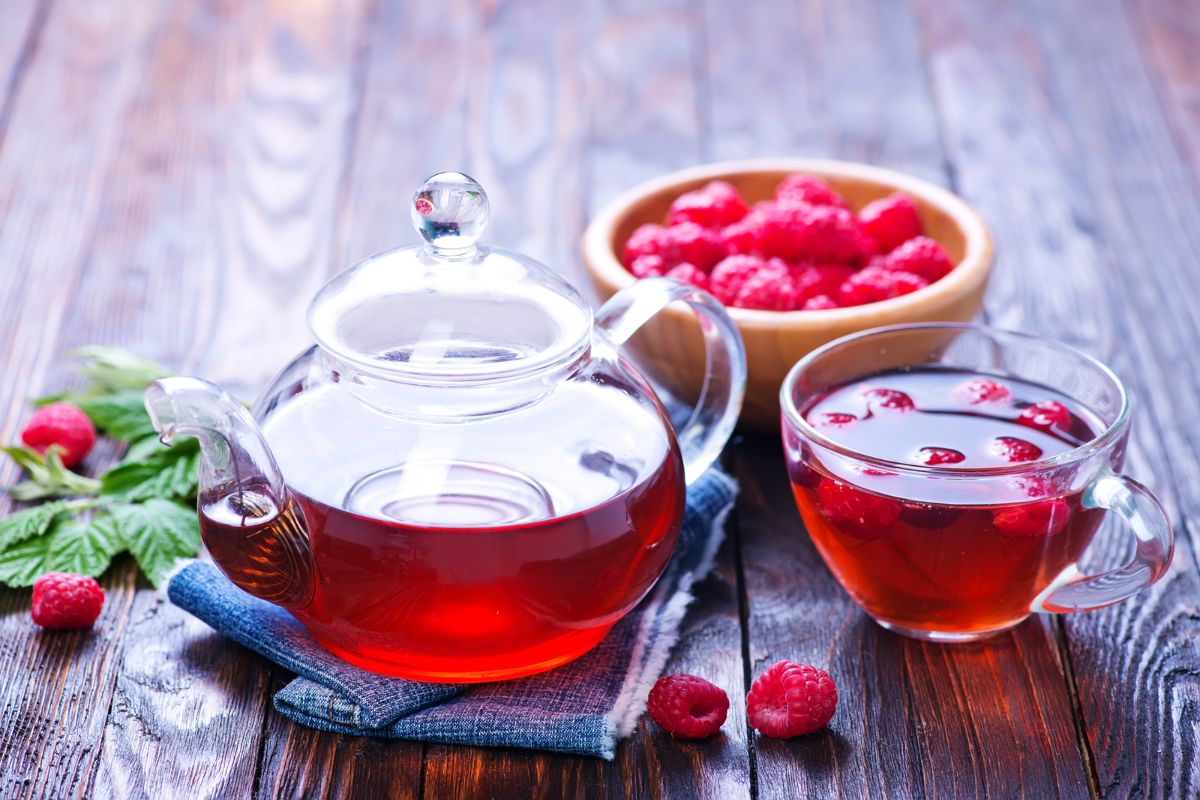Raspberry Leaf Tea: What It Is and Why So Many People Drink It

Alright, let’s talk about raspberry leaf tea. Not raspberry-flavoured tea. Not tea made with raspberries. I’m talking about the one made from the actual leaves of the raspberry plant. It sounds odd at first, but loads of people drink it, especially women, and it’s been around for years. Your nan might’ve had it in her cupboard. You’ll find it in loads of homes now too.
Table of Contents
ToggleFirst Things First: What Even Is It?
It’s exactly what it sounds like. The leaves from the raspberry plant are dried and made into tea. That’s it. There are no berries or added fruit bits, only the leaves themselves.
The taste? Honestly, it’s not fruity at all. It’s quite plain. A bit like black tea, but softer. Not bitter. Not sweet. Very easy to sip. You can drink it warm like any other tea, or chuck it in the fridge and have it cold.
You can get it in tea bags or loose leaf. Either way, it brews like normal tea. Nothing fancy.
Why Do People Drink It Then?
This one gets talked about a lot when it comes to pregnancy. You’ll hear midwives mention it, or someone at work will say, “Oh, raspberry leaf tea? Had it every day in my last trimester!”
It’s mostly known for helping tone the uterus. Sounds strange, but basically, it’s supposed to help your body get ready for labour. Some say it makes contractions more efficient or helps things go smoother during birth. No one’s saying it works like magic, but many women drink it from around 32–34 weeks onwards.
But it’s not just for pregnancy. Some drink it to help with period cramps, others just like it as a gentle herbal tea. A lot of people don’t even care about the “benefits”—they just like how it makes them feel.
Is There Science Behind It?
Sort of. There’s been a few small studies, but nothing massive. Some suggest it might help shorten labour a little or reduce the chances of needing forceps or extra help. But again—it’s not guaranteed.
You’ve probably heard this before, but it’s true: everyone’s body is different. What helps one person might not do anything for the next. That said, it’s been used for generations, so it’s not exactly new or risky if used sensibly.
If you’re pregnant though, definitely speak to your midwife first. Don’t just start drinking three cups a day out of nowhere.
How To Make It (Dead Easy)
With A Tea Bag
- Boil your kettle
- Pour water over the bag
- Let it sit for 5–10 minutes
- Done
With Loose Leaves
- Put a spoon or two in a teapot or infuser
- Pour boiling water over it
- Leave it for about 10 minutes
- Strain it into your mug
Some people add honey or lemon. Some drink it straight. I’ve even seen folks mix it with peppermint tea to give it a bit more life.
How Much Should You Drink?
If you’re just trying it out, start with one cup a day. That’s what most midwives say during pregnancy anyway. Some people build up to two or three cups later on, but again—check with your doctor or midwife, especially if you’re expecting.
If you’re not pregnant, you’ve got a bit more freedom, but still… start slow. Let your body tell you if it likes it.
Any Side Effects?
For most people, no. It’s gentle. But like anything, there are always a few people who might not get along with it.
Some say it made their Braxton Hicks feel stronger. Others said it gave them a slightly funny stomach for a day or two. That’s why it’s better to ease into it.
Also, don’t drink it in early pregnancy. That part matters. Most professionals suggest waiting until the third trimester.
Where Can You Buy It?
Easy. You’ll find it in most shops that sell herbal teas:
- Holland & Barrett
- Boots
- Big supermarkets like Tesco or Sainsbury’s
- Online – Amazon or any decent herbal website
It’s not pricey either. A box of 20 tea bags is usually between £2 and £5. The organic stuff is a bit more, but not by much.
Is It Worth Trying?
Here’s the thing: it’s not a miracle drink, and it won’t change your life overnight. But it’s a simple, natural tea that’s been around for ages and helps some people feel better.
If you’re pregnant and want to try it, just speak to your midwife. If you’re not pregnant but get bad cramps or just like trying different teas, it’s a nice one to have in the kitchen.
Worst case? You’ve got a calm, caffeine-free cuppa that helps you wind down at the end of the day.
Best case? It gives your body a gentle nudge in the right direction.
Final Words
Raspberry leaf tea is one of those things that keeps coming up for a reason. It’s been around forever. It’s not loud or flashy. It just does its job quietly.
If you’re curious, try a cup. You have nothing to lose. And who knows—it might become one of those little daily things you end up sticking with. Like a warm jumper or a walk in the park, sometimes the simplest stuff works best.
Published by Azura Everhart
I'm Azura Everhart, Digital Marketing Specialist, with over five years of experience helping brands grow through smart, data-backed digital strategies. Holding a Bachelor's in Business Administration and a Diploma in Digital Marketing Strategy, I specialize in building campaigns that connect, convert, and create lasting impact. I also write about the latest in business innovation and health trends, aiming to make complex ideas practical and engaging for modern audiences. View more posts







